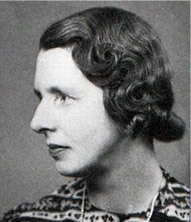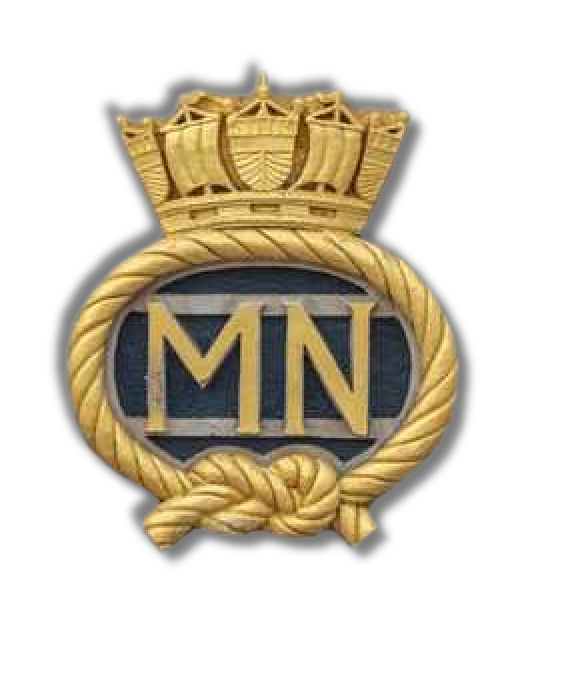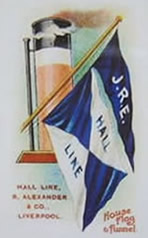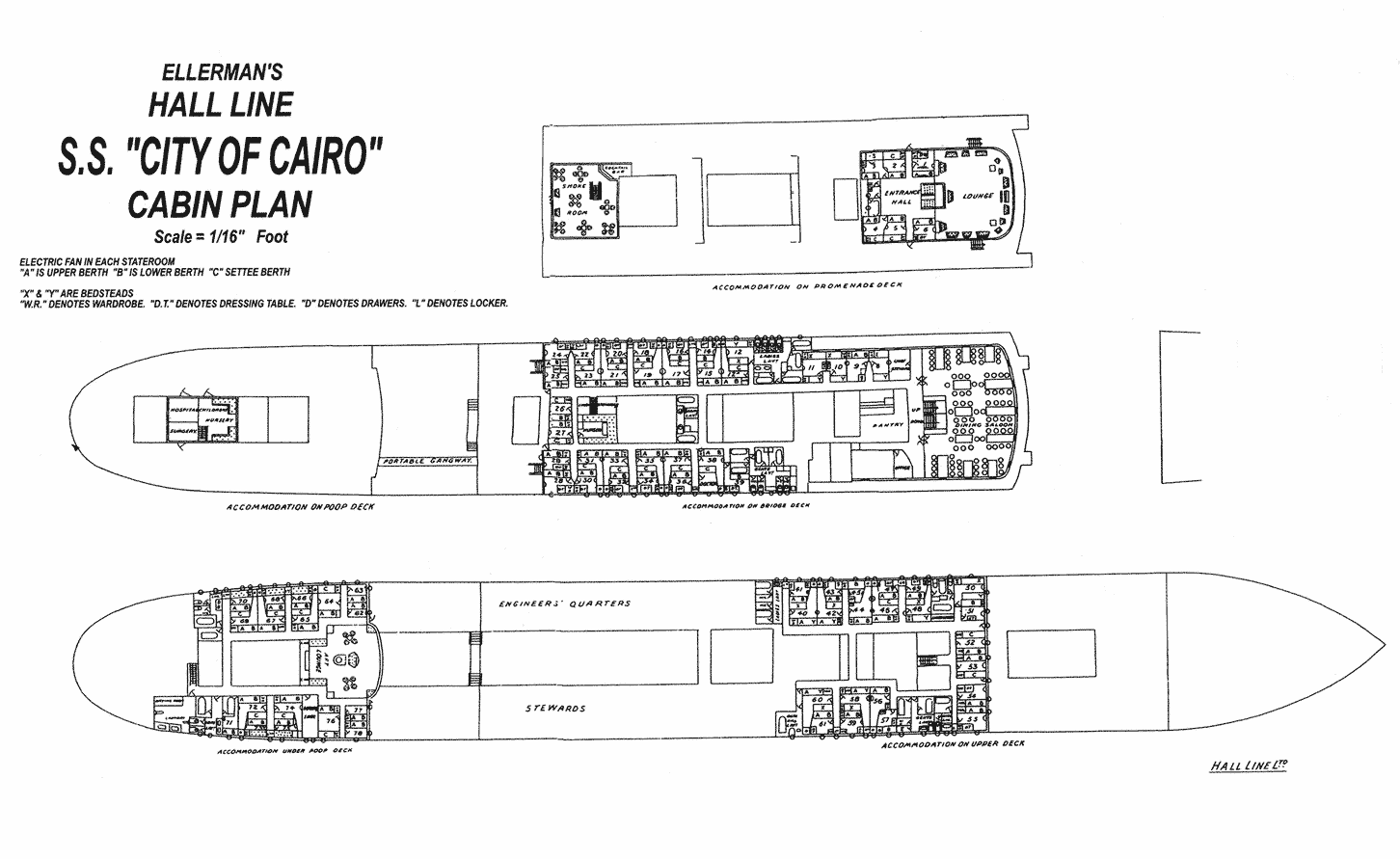14 Days in an Open Boat by Lady May Almond
(1893-1978) was the wife of Sir James Almond (1891-1964) who was the Judicial Commissioner, North-West Frontier Province, India in 1937.

Lady May Almond
On 3 August 1940, their three boys, Basil, Francis, David and their sister Susan along with their mother embarked at the port of Liverpool aboard the ss STRATHEDEN on a voyage to Bombay to join their father.
By 1942, India was looking increasingly vulnerable in the face of the Japanese advance through Burma, the couple decided that she should return to England so the children could continue with their education. In October 1942, they embarked at Bombay aboard the ss CITY OF CAIRO.
The following is Lady Almond’s account of 14 days in an open boat. This account received courtesy of William Meyers.
After much anxious thought, my husband and I had decided that our family, whom we had taken out to India in 1940, must return to England. We have three boys —Basil, aged 16; Francis, 13; David, 12, and a daughter, Susan, aged 10. The risk was great, we knew, but we judged it worth taking. On a steaming hot day the children and I set sail.
The disaster happened about five weeks later. It had been a lovely day, warm and sunny, with a sea as flat as a millpond. The first round of the ship's games tournament had been played off with great success. Dinner had just ended. Suddenly there was a shuddering crash. All the lights went out and the ship took a decided list. Susan was terribly scared at first, and began to whimper; but I reassured her.
She quickly pulled herself together very bravely, and we hastily set about collecting the torches, blankets, warm clothes and other things which we always kept ready for an emergency. In a very short time we made our way upstairs, meeting the three boys, all with their emergency bundles, on the way.
We had been well drilled in the early part of the voyage in finding the way to our boat stations, but to our horror; on arrival at No. 2 boat station, there was no boat — why, I have still not really discovered — and, still worse, there was not even a steward or a boat-warden to direct us where to go.
A Belgian couple with their little son also turned up, and together we began looking for another boat. We approached No. 4 boat, which was next to No. 2. "No more room here," said a voice in the blackness. "We're full up and just going down." And down they dropped before our eyes. This was horror indeed. The ship was listing more and more, and losing way, and no one knew when the enemy would strike again. I felt as if icy fingers were squeezing my heart. Someone shouted that there was a boat just leaving from the other side of the ship, so we quickly made our way over, and at last found places in No. 3 boat.
Among our companions were a very young widow evacuated amid fearful horrors from Burma with twin babies of about two years old, the ship's stewardess; a sick stewardess travelling as a passenger, Mrs. Gordon (whose subsequent adventures have already been told) and a Mrs. Jarman.
When all the women and children were aboard, the boat was let down — a truly terrifying proceeding, for first one rope would jerk down too far, and then the other, so that we were always at a perilous angle, and had to cling like limpets to avoid being jerked right out.
Eventually we reached the water without mishap, a rope ladder was let down, and the men began to join us. Several had come down, and Mr. Gordon (husband of the lady mentioned above) was half-way down the ladder when the second torpedo struck the ship; our little craft was struck by something from above, and we were all overturned into the water.
That, of course, meant goodbye to the warm clothes we had collected so carefully, and even to our money and passports. I remember thinking that this was the end for all of us, and being surprised that my past life did not pass in panorama through my mind, as it is always supposed to do on such occasions. Then, to my intense surprise, I found myself on the surface again, not far from the overturned boat.
Almost at once I heard a gasp of "Mummy" from close at hand, and there was Basil, still able to grin and remark that it was "a nice warm night for a bathe." We called the names of the others and quickly found Francis. The two younger children took, it seemed, an age to find. Anyhow, we finally collected ourselves. "Now," I said, "the first thing is to get right away from the ship as quickly as possible, in case we are drawn under with her when she sinks." By the light of the stars we saw one lifeboat within reachable distance. The others all seemed miles away.
Luckily, I am a fairly strong swimmer, and the boys have all been able to swim from a very early age, so we struck out for dear life (only too literally), towing Susan, who is not much of a swimmer yet, but familiar enough with the water to help herself a certain amount and to prevent her from panicking.
I was too intent on our objective to look back, but Francis happened to do so just as the poor old ship went under. He said that she slid into the water in a most peaceful and gentle manner, and happily we were far enough away not to be caught by the undertow. We reached the lifeboat safely, much relieved to be, as we thought, at the end of our swim. But no, as we approached the boat its occupants waved us away, shouting, "You can't get in here! We're sinking." True enough, its unfortunate passengers were sitting with the water up to their knees. Had it not been for the air-floats with which lifeboats are constructed, they must have sunk long before.
Someone was trying to explain to the Indian crew in the boat that if only they would trust to their lifebelts and get out for ten minutes or so, to let the boat be bailed, all would be well. But nothing would move them. They simply sat there dithering and murmuring "Allah! Allah!" Several British women got out as an example, among them Diana Jarman, who eventually died so tragically. We swam and trod, water round them — all except Susan, who, being light, was invited into the boat. There were several others swimming around with us, and we all made ourselves useful by hanging on to the sail, a keg of water, and various oddments in the way of oars, boat-hooks, etc., which were in danger of floating away.
At last, an hour and a half after we had been thrown into the water, we saw some of the distant lifeboats approaching, and called out for help. Our call was answered, and two boats came up and took all of us swimmers aboard. Some thoughtful person thought of having Susan transferred in order to be with me, and Basil also was picked up by the same boat. The two younger boys, however, were at first in Third Officer Whyte's boat, with Mrs. Gordon, who was most kind and motherly to them.
The waterlogged boat was afterwards bailed out and made sea worthy. As soon as we were taken from the water we were made to take off our soaked clothes and were given a blanket each in which to wrap ourselves. Luckily it was not cold. I spent the next day clad in a blanket and a pearl necklace while my clothes were hung out in the sun to dry!
It was about 10.30 p.m. when we were picked up. All the boats spent the rest of the night rowing slowly around and avoiding the wreckage that floated here and there on the surface. Like St. Paul, we wished for the dawn.
It came at long last, and boats which were within hailing distance of each other exchanged news and rumours, and we all scanned the other boats anxiously to see whether our particular friends were safe. At dawn the captain, who, with several other officers had been picked up from a raft, assembled the six lifeboats and announced that he intended to make for St. Helena, and gave us our direction. He told us all to keep in touch, and to reassemble for orders again in the evening.
To take command of our boat he sent us First Officer Tommy Green, of another shipping line, going home on leave as a passenger. Despite a badly wounded hand, which gave him great pain, Tommy did a most able job of work, aided by two grand Scots quartermasters, in piloting us through all our difficulties to safety.
There was no wind at that stage, and rowing had to be kept up all day. This was appallingly difficult in our particular boat, for out of 22 British passengers, eight were children, five women and a high proportion of the men were old or unfit. These seagoing oars are tremendously heavy, and it took two or even three men to each. My eldest son and I took our turn when necessary, but of course neither of us was strong enough or heavy enough to be of much use, with the best will in the world.
As soon as it was light the first rations were distributed — a biscuit each with pemmican, two Horlick's tablets, and a small piece, about two square inches in size, of delicious chocolate. With this we were allowed a small medicine glass of water— four ounces. We received this ration twice a day throughout the time that we were at sea, and it was calculated to last us for about 24 days if necessary.
At this stage we noticed three rather attractive-looking black-and-white striped fish following the boat, and remarked on them.
"Aye," said one of the ship's crew, "them's pilot fish — lead the sharks to their prey." We looked again, and there indeed was the shark behind them, its sleek, slate-coloured body greedy for human flesh. A most sinister reminder of our plight. All that day it followed us, but getting nothing, left us during the night.
The next day a useful breeze sprang up, and we were able to hoist our scarlet sails. The six little boats made quite a cheerful and attractive sight, travelling with their gay sails under a blue sky. We noticed at once, however, that our mast had a crack, and feared for what might happen if the breeze stiffened. Sure enough, on the next day it did stiffen, and the waves rose and fell like a scenic railway. This morning the captain decided that my two younger boys had better be transferred to the same boat as the rest of the family.
The boats were cleverly manoeuvred to within about three feet of each other, and somehow prevented from colliding. Someone held out a hand and said "Jump!" and in turn they jumped, as with us again, smiling and full of fun, chattering about their various experiences in the other boat.
How I thanked God for the captain's decision can be imagined when I say that the boat which they left was only picked up after 51 days at sea with but two survivors. The nights were fearsome. The seven children were put to sleep below, and although they were cramped, they were at least warm and able to get a good deal of sleep.
The adults — among whom my 16-year-old insisted on counting himself — had to sit up on the seats (or whatever they are called in nautical language), and the most that we could do was to lean against each other and try to keep one another warm.
Invariably there was some piece of the boat or its equipment sticking into one's back or thighs and I do not think that any of us slept for more than a few minutes on end during the whole time. During the first five days, when the boats were all sailing in convoy, we had to keep careful watch for the flashlight signals of the other boats — fearfully difficult in a phosphorescent sea with deep waves. It was so easy to miss a signal altogether when we were in the trough of a wave; and when the other boats were not yet near it was almost impossible to distinguish between the flash of a torch and a patch of phosphorus.
I spent many hours, in turn with others, in this anxious-making search, on several rough and squally nights, and I look back upon them as some of the worst that I ever spent. The nights were cloudy and, standing up in the stern, one had an impression of moving steeply downhill in a stretch of parkland or on a skiing slope, the clouds forming themselves into patches of forest in front and to the sides. At times, however, there were scenes of real beauty. We saw some particularly exquisite sunsets, and some of the cloud formations were strange and rare.
If anything unpleasant had to happen, it invariably happened during the night. About the second night, a delightful old Scotsman, a refugee from Burma, fell overboard just as he was changing places. In spite of our cries of "Man overboard," the boat following us was unable to reach him. This saddened us all, for he was very popular with everyone. The preceding afternoon, a Sunday, he had suggested that we should have a sing-song of hymns, and we had all welcomed the suggestion, and enjoyed lifting up our voices, though it made us very thirsty.
Though we had several sing-songs, sometimes of sea shanties or traditional songs, or of nursery rhymes, the prevailing tone of our selections was always cheerful — we firmly kept off anything sentimental or morbid. One rough and windy night, we always had great difficulty in keeping the boat properly trimmed. The Indians would remove themselves from the weather side where the waves were dashing over, and that would overweigh the boat dangerously on the lee side.
Then, when they were ordered to return, there would be grumbling and angry mumblings in the darkness.
Let me make it quite clear here and now that no adverse criticism which I have made, or shall make, about the individual Indians in this particular boat apply in any sort of way to the great Indian race or to Indian seamen as a whole. These particular men were bad specimens, such as may crop up in any country the world over.
It was, I think, during the fourth night that our cracked mast, which had gradually been looking more and more unsafe as the breeze strengthened, carried away altogether. One of our clever quartermasters managed to repair it with the scant material at his disposal, but after this we could not use as much sail as the other boats, and had difficulty in keeping up with them. Indeed, during the following night we became separated from the rest of the convoy, as we could not sail fast enough to keep within sight of their flashes, and in the morning, to our intense consternation, we found ourselves alone with Third Officer Whyte's boat, which had caught up again after being separated for a time.
We sailed together all the next day and night, but Mr. Whyte subsequently decided to go off on a line of his own and, wishing each other luck, we separated. It seemed a most fateful parting — as indeed it was — and I find it difficult to describe the awful sensation of being left in a solitary little boat, in the middle of the wide ocean. All that we had for checking our direction was a Girl Guide compass.
Day followed day in this awful monotony without a sight of any ship or plane, and I think that as we saw 1 "Lockie" Whyte's boat fade into the distance all our hearts involuntarily sank, and we wondered whether after all our number was up. We were beginning to feel the result of the low rations pretty badly by this time, and the slightest exertion dried our throats unbearably. The children's faces were beginning to look peaky and strained, but only the two youngest ever complained.
I suppose I ought not to praise my own family, but I could not help being proud of their cheerfulness, self-control and endurance. The two elder children of the other family were equally wonderful.
In the earlier stages we played guessing games with them, and enjoyed these interludes; but later the effort of speech made our throats too dry and we had to cut out all unnecessary conversation. The days passed away somehow, and if anything happened to break the monotony it was usually something unpleasant. One squally night the halyard broke, and the sail fell heavily and injured the shoulder of one of the British crew.
We were most fortunate in having with us a particularly splendid Methodist missionary, who had been in the R.A.M.C. in the last war and knew a great deal about doctoring. Though anything but fit himself, he tended anybody who was sick or injured with the utmost devotion.
He was entirely selfless, and I do not think I have ever met a more Christ-like character. He did not talk over-much about religion, but the example of his life and faith were an inspiration, and his help in smoothing over any ill-feeling that arose was beyond reckoning. He held several in formal little services for us, which many of us found very helpful. We were of many creeds — Church of England, Church of Scotland, Presbyterian, Methodist, etc., but all gladly joined together in our devotions. On one terrible occasion the Indians made trouble about their rations, refusing to believe they were getting a "square deal." When Tommy Green, our officer, tried to reason with them, two of them so inflamed the mob that the cry went up, "Throw him overboard!"
Tommy handed the tiller to someone else and jumped among them unarmed and with a wounded hand. In his weakness the situation looked ugly until our missionary jumped in front of Tommy and spoke to the Indians in their own language. His courage so impressed the rebels that they were subdued, and for a day or two they gave no further trouble. Shortly after dawn on the fourteenth day we were just beginning to bestir ourselves when one of the men forward shouted: "A ship! A ship!" And there away on the horizon actually was the silhouette of a ship. Our excitement was electric. Our first thought was water. Now we could safely drink our fill, and the remaining cask and a half were very soon drained to the dregs.
Nearer and nearer slid the ship, and we could distinguish faces above the rails. Were they British faces? Or Dutch? Or perhaps Scandinavian? Please God, not German. And then we caught sight of one round rubicund face that could only be British, and we felt quite reassured. At last we were alongside, and rope ladders were lowered. The Indian crew had no idea of letting women and children go first and up they swarmed before anyone could reach the ladders. We let them go and then our skipper told me to lead the way. I never thought that I could bring myself to climb a perpendicular ladder up a ship's side, even in my fittest days. But it is wonderful what you can do when death is behind and safety in front. I collected my remaining energy and got to the top, but had to be lifted on to the deck and, overcome with relief, collapsed on the top of a hatch.
Presently the children were helped up, one by one, and pleasant-faced Chinese servants ran round with large jugs of hot, sweetened cafe-au-lait. Never have I tasted anything so delicious. The ship's officers assured us that it was very ordinary coffee, but I shall never believe it. The kindness and hospitality of our rescuers was past telling.
1 I presume this should be "Knocker" rather than "Lockie".






